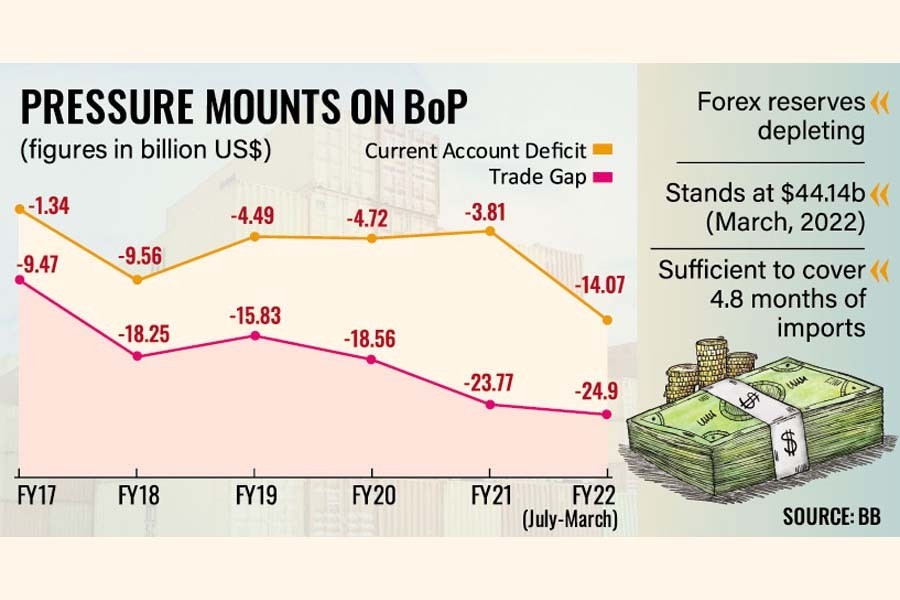SIDDIQUE ISLAM
Published:2022-05-10 03:13:20 BdST
Widening trade deficit, lower remittance inflow in July-MarchCurrent-account deficit balloons to $14 billion
Bangladesh's current-account deficit hits an 'all-time high' at $14.07 billion as widening trade gap coupled with lower remittance receipts affects the macroeconomic balance, officials say.
The country's trade deficit reached nearly a $25-billion mark in the first nine months of the current fiscal year for higher import bill largely for global price spirals, they add.
The trade gap with the rest of the world increased by nearly 64 per cent or $9.69 billion to $24.91 billion during the July-March period of the fiscal year (FY) 2021-22, from $15.22 billion in the same period of FY'21, according to the central bank's latest statistics, released Sunday.
During the period, import expenses ballooned nearly 44 percent while export earnings recorded a nearly 33-percent growth, upsetting the balance-of-payments (BoP) barometer for the economy.
The overall import cost stood at $61.52 billion in the July-March period against $42.77 billion in the same period a year before while export earnings rose slower to $36.62 billion from $27.55 billion.
Senior economists and experts urge the policymakers to take effective measures immediately to boost export earnings for narrowing the gap in the country's external trade.
They also request the central bank to revisit the expansionary monetary-policy stance, if necessary, to contain the inflation without hampering economic growth.
"Unnecessary imports should be contained immediately through streamlining policy measures," Mustafa K Mujeri, executive director of the Institute for Inclusive Finance and Development (InM), said.
Mr Mujeri, also a former chief economist of the Bangladesh Bank (BB), suggests the country's export earnings should be enhanced soon by exploring new markets with fresh products in the basket.
"We've to offer fresh incentives for boosting export earnings, if necessary," the senior economist notes.
Regarding monetary policy, the former BB chief economist says the central bank may follow cautious monetary policy instead of the existing expansionary monetary-policy stance in view of the overall economic situation.
"The central bank may revisit its monetary-policy stance to curb inflation without any depression impact on the economy," Mr Mujeri said in reply to a query.
A senior BB official said the country's overall import expenses increased significantly recently amid a fresh hike in prices of essential commodities, including fuel oils, on the global market mainly due to the ongoing Russia-Ukraine war.
He also said the existing trend in import-payment obligations could continue in the months ahead if the Russia-Ukraine war prolongs.
Actually, the foreign trade, covering import and export, increased significantly during the period under review amid the gradual reopening of economic activities-both domestic and global-after more than one year of pandemic pause.
Meanwhile, Bangladesh's current-account deficit exceeded $14-billion mark during the period under review following higher import payments alongside lower inflow of remittances.
The current-account deficit rose to $14.07 billion during the July-March period of FY'22 from $12.81billion a month ago. It was $555 million deficit in the same period of FY'21.
On the other hand, the flow of inward remittances dropped by 17.74 percent to $15.30 billion in the first nine months of FY'22 from $18.60 billion in the same period of FY'21, BB data show.
The experts predict that the ongoing upturn in the current-account deficit may continue in the months to come if the lower inflow of remittances and higher import expenses persist.
They also say pressure on foreign-exchange market may increase in the coming months if the upward trend in current-account deficit continues.
However, the financial account's surplus improved significantly mainly due to higher inflows of medium-and long-term (MLT) loans as well as aid flows, according to the BB officials.
The financial-account surplus jumped nearly 43 per cent to $11.34 billion during the July-March period of this fiscal year from $7.95 billion in the same period of FY'21.
The inflow of MLT loans rose by more than 56 per cent to $6.62 billion during the period under review from $4.23 billion in the same period of FY'21 while net aid flows rose to $5.45 billion from $3.17 billion.
Actually, the gaping deficits in trade as well as the current account reflect the growing imbalance on the external front, thus creating mounting pressure on the country's overall balance of payments or BoP.
The BB data show that the BoP posted a negative balance of $3.10 billion in the first nine months of FY'22 against a positive balance of $6.99 billion in the same period of FY'21.
"Our external sector is now under pressure following higher trade deficit alongside the negative current-account balance," another central banker, also an economist, said while replying to a query.
"We need an appropriate policy to overcome the pressure on the economy," he notes.
Unauthorized use or reproduction of The Finance Today content for commercial purposes is strictly prohibited.


